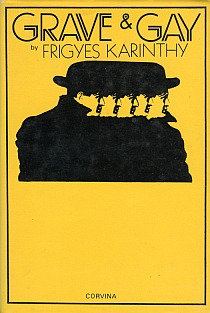

CONTENTS |
|
| I THE GRAVER SIDE OF LIFE | |
| 1 MAN AND WOMAN | |
| Between the Lines of Verse (Két verssor között) Translated by László András T. | 11 |
| A Good Joke (Jó vicc) Translated by Rudolf Fischer | 15 |
| Guilt (Bűn) Translated by Rudolf Fischer | 20 |
| Make-Up (Festék) Translated by István Farkas | 27 |
| Days (Napok) Translated by Rudolf Fischer | 31 |
|
2 WAR AND PEACE |
|
| Barabbas (Barabbás) Translated by István Farkas | 37 |
| The Skirmish (Az ütközet) Translated by Rudolf Fischer | 41 |
| Prologue (Prológus) Translated by László András T. | 48 |
| The House on Fire (Az égő ház) Translated by László András T. | 54 |
| 3 EGO AND LITTLE EGO | |
| Ego and Little Ego (Én és énke) Translated by István Farkas | 61 |
| The Nightmare (Az álom) Translated by István Farkas | 68 |
| Thirst (Szomjúság) Translated by István Farkas | 70 |
| The New Life (Az új élet) Translated by István Farkas | 78 |
| 4 MAN AND HIS WORLD | |
| Meeting with a Young Man (Találkozás egy fiatalemberrel) Translated by István Farkas | 89 |
| Abdominal Operation (Hasműtét) Translated by István Farkas | 95 |
| Blind Chick (Vak csibe) Translated by Rudolf Fischer | 104 |
| The Circus (A cirkusz) Translated by György Welsburg | 109 |
| Genius (Géniusz) Translated by István Farkas | 116 |
| Loneliness (A magány) Translated by Mari Kuttna | 122 |
| Two Ships (Két hajó) Translated by Mari Kuttna | 129 |
| II THE LIGHTER SIDE OF LIFE | |
| 1 MAN AND WOMAN | |
| The Echo (Ugyanaz férfiben) Translated by László András T. | 147 |
|
Your Husband (A te férjed) Translated by Rudolf Fischer |
153 |
| The Stranger (Az idegen) Translated by László András T. | 157 |
| I’ve a Feeling... (Nem tudom, de nekem a feleségem gyanús ... ) Translated by István Farkas | 161 |
| A Fixed Faithfulness (A megrögzített hűség) Translated by Rudolf Fischer | 165 |
| Encounter (Találkozás) Translated by László András T. | 168 |
| The Beauty of the Body (Testi szépség) Translated by László András T. | 171 |
| 2 WAR AND PEACE | |
| A Letter to His Excellency (Levél a tisztelt fódiplomata úrhoz) Translated by Mari Kuttna | 175 |
| The Ideal Hell (Azideális pokol) Translated by Mari Kuttna | 177 |
| The Mars and District Post (Mars és vidéke) Translated by Mari Kuttna | 181 |
| 3 EGO AND LITTLE EGO | |
| Aunt Euphemia, Freddy and the Marquis (Stanci néni, Frédi és a márki) Translated by Elisabeth Hoch | 185 |
| Two Games (Két játék) Translated by Rudolf Fischer | 190 |
| At the Psychiatrist’s (Az idegorvosnál) Translated by László András T. | 193 |
| Light Conversation (Könnyed társalgás) Translated by László András T. | 195 |
| Mrs. Buxbaum the Tree (Buxbaumné, a fa) Translated by László András T. | 198 |
| The Tortoise (Teknősbéka, vagy ki az őrült a csárdában) Translated by Rudolf Fischer | 201 |
| 4 MAN AND HIS WORLD | |
| A New Life (Új élet) Translated by Rudolf Fischer | 215 |
| He Was an Ordinary Newsboy (Mint egyszerű rikkancs kezdte) Translated by Mari Kuttna | 218 |
| I Am Fond of Animals (Szeretem az állatot) Translated by István Farkas | 221 |
| The Policeman (Rendőr) Translated by Mari Kuttna | 224 |
| Scholarship Gets Its Own Back (A bosszús tudomány) Translated by Rudolf Fischer | 226 |
| Conversation with a Decent Man (Beszélgetés egy jó emberrel) Translated by István Farkas | 229 |
| A Farewell to Melons and Readers (Búcsú a dinnyétől és az olvasótól) Translated by István Farkas | 233 |
| About the Author by Károly Szalay | 239 |
[Inside front jacket:]
Frigyes Karinthy (1887-1938) was one of the most versatile and exciting figures of twentieth-century Hungarian literature. In the course of his intellectual adventures he conquered an unparalleled variety of literary genres—humorous sketches, satires, short stories, novels, literary parodies as well as poems, dramas, cabaret sketches and essays. His prose in the first decade of this century places him among the earliest literary representatives of in-depth psychological analysis, while another side of his writing reveals him as a precursor of absurd humor.
The alternate use of the tragic and humorous approach is characteristic of his literary attitude; indeed the same theme is often treated from both angles. The concept of the present selection is based on this very duality in Karinthy. His principal themes are the man-woman relationship, the conflict between the conscious and subconscious self, all of which are present in this volume in dramatic and humorous, tragic and grotesque interpretations alike.
SOURCE: Karinthy, Frigyes. Grave and Gay: Selections from His Work, selected by István Kerékgyárto, afterword by Károly Szalay, binding and jacket by István Bányai. 2nd ed. Budapest: Corvina Press, 1973. Contents, pp. 5-7. ISBN 963 13 0907 X
Frigyes & Ferenc Karinthy in English
Frigyes (Frederiko) Karinthy (1887-1938) en Esperanto
Sándor Szathmári (1897-1974): Bibliografio & Retgvidilo / Bibliography & Web Guide
Esperanto & Interlinguistics Study Guide / Retgvidilo pri Esperanto & Interlingvistiko
Alireteje: Offsite:
Frigyes Karinthy @ 50 watts
Home Page | Site Map
| What's New | Coming
Attractions | Book News
Bibliography | Mini-Bibliographies
| Study Guides | Special
Sections
My Writings | Other
Authors' Texts | Philosophical Quotations
Blogs | Images
& Sounds | External Links
CONTACT Ralph Dumain
Uploaded 17 February 2016
Last update 26 February 2022
Site ©1999-2022 Ralph Dumain